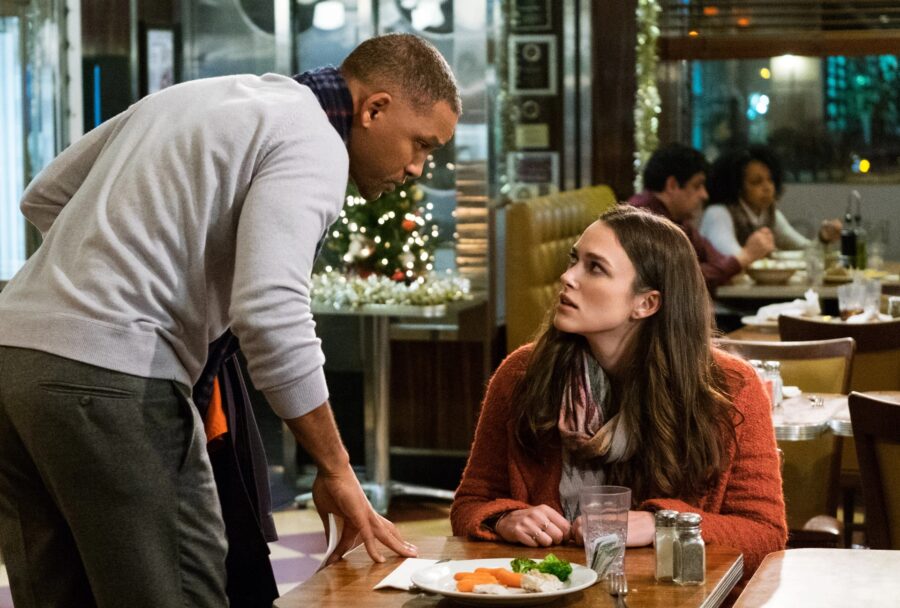The Will Smith Flop That Lied To Audiences
The 2016 Will Smith led drama Collateral Beauty misled fans with its marketing.
You know the story of Ebenezer Scrooge. Originally told in Charles Dickens’s 1843 novella A Christmas Carol and adapted countless times, Scrooge–a cruel miser–is redeemed after first being visited by the spirit of his dead business partner and then by three ghosts who reveal to him the past, present, and the grim future. Imagine you’d never seen or heard the story, but saw a trailer or two for a movie adaptation that gave you the general idea. Then imagine that when you went to the theater expecting to see a drama about redemption and regret, but instead you learn the film is about a group of people pretending to be spirits and ghosts in an elaborate ruse designed to swindle Scrooge out of his money. Your reaction would likely be similar to how audiences responded to the 2016 Will Smith led drama Collateral Beauty.
In Collateral Beauty, Will Smith plays successful advertising executive Howard Inlet who is grieving the death of his daughter. In the wake of the tragedy Howard is barely eating or sleeping. His behavior at the office becomes unpredictable, with the ad exec building elaborate domino structures and exhibiting other behavior that sends clients running for the hills. Concerned both for their friend and for their business, Howard’s partners–Claire (Kate Winslet), Whit (Edward Norton), and Simon (Michael Peña)–hire the private investigator Sally Price (Ann Dowd) to find out what Howard’s doing when he’s not at work. Price returns with a report that their friend and business partner is writing letters to Time, Love, and Death. All of this was in the marketing for the film, as you can see for yourself in the trailer below. However, all of that marketing left out a very big detail.
What neither the trailer above nor any of the marketing for Collateral Beauty revealed is that while Will Smith appeared to be actually speaking to the personifications of Time, Love, and Death; it’s all a con. When they learn that their Howard is sending letters to not people but concepts, Howard’s partners hire three small time actors–Brigitte (Helen Mirren) who pretends to be Death, Raffi (Jacob Latimore) who is cast as Time, and Amy (Keira Knightley) who plays Love. Their plan is to get the actors to convince Howard Inlet they are the concepts he’s been writing letters to, to engage him in conversation which will be recorded, and then afterward to digitally erase the actors to make it appear as if Will Smith’s character is speaking to someone who isn’t there. The goal is to have Howard–who owns the controlling interest in their company–legally deemed mentally impaired so they can take his piece of the company from him.

More than anyone, critics didn’t appreciate the misleading advertising and Collateral Beauty suffered for it. The film has the lowest aggregate critics’ score on Rotten Tomatoes (13%) of any Will Smith flick to date, with the sole exception of 2013’s After Earth. To put that in context; that means critics hated Collateral Beauty more than they hated the live-action Aladdin remake, Gemini Man, Hancock, David Ayer’s Suicide Squad, or–God help us all–Wild Wild West. The attacks from critics got so bad that Deadline‘s Anthony D’Alessandro posted an op-ed suggesting that an unnamed Collateral Beauty production member was right in calling it a “schoolyard assault” and that it was an example of online critics being largely responsible for causing a movie to bomb at the box office.
Whether or not D’Alessandro was right, it’s clear reviewers had fun tearing Collateral Beauty apart, and we doubt any critics had more fun with it than Uproxx‘s Vince Mancini. We won’t reproduce his entire rant about the film here, but some noteworthy moments include when he refers to the dialogue as “bad cola commercial slogans it thinks are Oscar drama trailer lines” and adds those lines are “a brand of unacknowledged Hallmark horsesh-t” serving as “Collateral Beauty‘s only method of communication.” He also convincingly argues that not only was the film’s marketing unforgivably misleading, but that the con perpetrated against Will Smith’s character is absurdly convoluted:
“If you have the power to digitally erase people, and all it takes to get Howard declared crazy is some film of him talking to no one, why not just digitally erase anyone he talks to?”
-Vince Mancini for Uproxx
With the film having released six years ago and the misleading advertising no longer being an issue, audiences might be able to appreciate Will Smith film more today. If you want to find out yourself, it’s currently streaming on Netflix.













